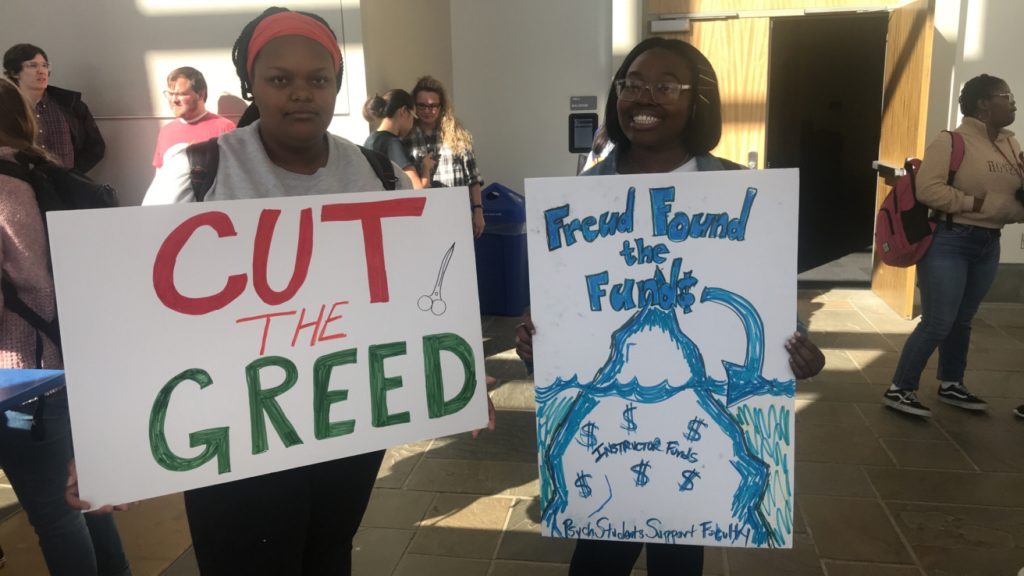UWG students lined the walls of the Campus Center Ballroom and held protest signs on Nov. 11, during an open forum meeting regarding the university’s current budget crisis and proposed faculty cuts of first and second-year hires via non-renewal letters.
The open meeting came shortly after a closed meeting of the Faculty Senate on Friday, Nov. 8. UWG interim President Dr. Micheal Crafton and interim Provost David Jenks issued apologies for the “confusion” and “miscommunication” surrounding the budget crisis at both meetings.
“In the future, I pledge all my efforts in being as clear and transparent as possible, and I promise I will do better,” said Crafton.
The university is pointing to a decline in enrollment of approximately 500 undergraduate first-year freshmen this academic year as the reasoning behind the budget cuts and the issuing of non-renewal letters to an undisclosed number of faculty.
“There has to be a focus on enrollment and enrollment strategy in order to turn this picture around,” said Tracy Cook, Executive Vice Chancellor for Fiscal Affairs at the University System of Georgia (USG).
USG receives $2.6 billion in state funding and those funds are allocated across 26 institutions to support the teaching mission at each institution. UWG is one of those institutions and received 32.27% of its funding from state appropriations totaling $67.4 million for the fiscal year 2020. The second-largest portion of the institution’s budget comes from tuition totaling $64.3 million. The overall budget for the fiscal year 2020 totals $208 million. So where is all this money going?
Many students may ask why the institution is putting up new signs and building new buildings when the jobs of professors are hanging in the balance, but Cook says it is because there are “distinct sources of funding that cannot be commingled.”
One of the major concerns for students going into the meeting was that the non-renewal letters meant their professors were getting cut. Crafton clarified that a non-renewal letter is not a termination but a precaution stating that a teaching contract for the next academic year was not guaranteed. Despite these statements, some professors felt that the specific wording of the letter did indicate a guaranteed termination.
According to the American Association of University Professors Leader, Matt Franks, the non-renewal letters that were given to professors, read as follows:
“As the authorized representative of Interim President J. Michael Crafton and pursuant to the policies of the Board of Regents, I am writing to advise you that no new employment contract will be offered to you for the 2020-21 academic year. The 2019-2020 academic year will, therefore, be a terminal one.
I wish you personal and professional success in the future.
Sincerely yours,
Dr. David A. Jenks
Interim Provost and Vice President for Academic Affairs”
Other professors felt that there was not clear communication before the non-renewal letters were given.
“It was done abruptly. Our deans and our chairs were not properly notified, so we did not see this coming,” said Robyn Hicks, Mass Communications assistant professor. “We were told that we were in a hiring freeze which means that no new people are coming on, no new lines are being created, but we thought if you were here, you were safe. That is not obviously the case.”
Some UWG students feel that there already is not enough staff to cover certain departments and that cutting staff is not going to help future enrollment numbers.
“I already know that the Art department is understaffed,” said student protestor and UWG junior, Alanna LeBlanc. “They can’t expect more students to want to enroll here if the school’s not even offering programs that they need.”
This concern is especially real in the Mass Communications Public Relations department, where two of the three PR professors, assistant professors Kelly Williams and Taylor Bryant, received letters of non-renewal.
“Our students are already constantly seeking overrides into our courses,” said Williams. “Without Professor Bryant and I to help the course load, Dr. Cole, though she is an amazing mentor and talented professional and professor, will be overworked trying to cover one of the largest concentrations.”
Other students fear that the faculty cuts will have an even more drastic impact.
“A lot of professors are here on a work visa, so if they lose their job, they are going to get deported, and that’s already an issue we have out here is people getting deported for no good reason,” said student protestor and UWG freshman, Justice Lee.

One of the things that will be impacted most by faculty cuts is diversity, according to Hicks. There is currently a diverse faculty at UWG and also a diverse student body, and by cutting faculty diversity, underrepresented student groups may not choose to attend UWG, furthering the enrollment issue.
The biggest frustration amongst professors is that there has not been much tact or communication throughout this entire budget-cutting process. Hicks does not understand why she, as a second-year hire, did not receive a non-renewal letter but her colleagues did.
“Were asking for transparency in the process and that has not been given,” said Hicks. “We’re also asking for a shared governance of how these decisions get made, and we’re not really sure as to what the criteria was in making these decisions to begin with.”
Crafton said there is a pledge for future meetings regarding budget and faculty cuts but “no plan.”
You may also like
-
UWG Fails to Protect Student Safety From Radical Conservative Rhetoric Under the Guise of Free Speech
-
UWG’s Ingram Library Hosts Pop-Up Study Spot to Help Students Prepare for Finals Week
-
UWG Offers Mental Health Support And Academic Services To Maintain Student Success During Finals Week
-
UWG Alumnus Shares His Experience Exploring the Underground Flood Channels of Las Vegas
-
Georgia Students Simulate the Struggles of Dementia